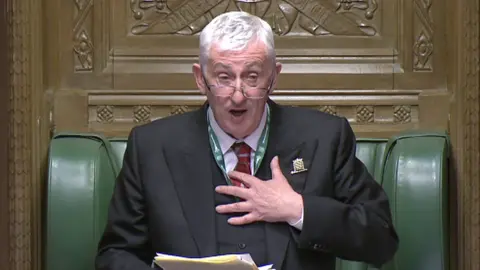Gaza ceasefire vote: Commons debate descends into chaos
A Commons debate on calls for a ceasefire in Gaza descended into chaos, after the Speaker was accused of allowing it to be "hijacked" by Labour.
Sir Lindsay Hoyle sparked fury from the SNP and Conservatives when he broke with convention to allow a vote on a Labour motion for an "immediate humanitarian ceasefire".
The Speaker later apologised, saying he had acted "with the right intentions".
But the SNP said they had been "treated with complete and utter contempt".
Labour's amendment went through to loud shouts of "aye" without a formal vote, after the government said it would not take part in protest.
This meant there was no vote on the SNP's motion, which called for an "immediate ceasefire", and was originally meant to be the focus of the debate.
The government does not have to adopt Labour's position as the vote is not binding.
In extraordinary scenes, SNP MPs and some Tories walked out of the chamber over the Speaker's handling of the vote.
Following calls for him to return to explain his decision, Sir Lindsay told the Commons he chose to allow a vote on the Labour motion so MPs could express their view on "the widest range of propositions".
Amid shouts of resign, he said: "I thought I was doing the right thing and the best thing, and I regret it, and I apologise for how it's ended up.
"I do take responsibility for my actions, and that's why I want to meet with the key players who have been involved."
SNP Westminster leader Stephen Flynn said whilst he acknowledged the Speaker's apology, Commons officials had warned the decision could lead to his party not having a vote, on a day which had been designated an SNP opposition day.
Visibly furious, he said his party had been treated "with complete and utter contempt".
"I will take significant convincing that your position is not now intolerable," he added.
In a statement after the debate, Mr Flynn said it was "a disgrace that Sir Keir Starmer and the Speaker colluded to block Parliament voting on the SNP motion".
"This should have been the chance for the UK Parliament to do the right thing and vote for an immediate ceasefire in Gaza and Israel - instead it turned into a Westminster circus," he added.
 UK Parliament
UK ParliamentIt came after Commons leader Penny Mordaunt said Sir Lindsay had "undermined the confidence" of the House and suggested his decision had allowed the debate to be "hijacked" by Labour.
She said this had "has raised temperatures in this House on an issue where feelings are already running high".
Earlier, a source close to the Speaker said the suggestion he was pressurised was "absolutely untrue".
Sir Keir accused the Conservatives and SNP of "choosing political games over serious solutions".
"Today was a chance for Parliament to unite and speak with one voice on the horrendous situation in Gaza and Israel," he said in a statement following the debate.
Sir Lindsay was first elected as a Labour MP but after becoming Speaker he relinquished his party affiliation, as is the convention.
While he said he would meet key MPs from the main parties to discuss what happened, intense pressure remains on the Speaker.
More than 30 Tory and SNP MPs have declared they have no confidence in him by signing an early day motion.
Very few early day motions are debated but they allow MPs to show their support for an issue.
The debate took place as thousands of pro-Palestinian demonstrators gathered in Parliament Square.
Throughout the day, a long queue had formed outside the Commons, with protesters hoping to lobby MPs in person to support a ceasefire.
Sir Lindsay's decision meant Labour leader Sir Keir Starmer avoided another potential rebellion over the party's position on Gaza as Labour MPs were able to show their support for a ceasefire without voting for an SNP motion.
The motion went further than Labour's by calling for an end to the "collective punishment of the Palestinian people".
Labour's shadow foreign secretary David Lammy also argued it did not "lay out a path to a sustainable peace" and "appears to be one-sided".
"For any ceasefire to work it must by necessity be observed by all sides," he added.
Labour's own amendment noted that Israel "cannot be expected to cease fighting if Hamas continues with violence" and called for a diplomatic process to deliver "a safe and secure Israel alongside a viable Palestinian state".
Last November Sir Keir suffered a major revolt when 56 of his MPs, including 10 frontbenchers, defied him to back an SNP motion urging an immediate ceasefire.
Earlier this week, Labour shifted its position to call for "an immediate humanitarian ceasefire", following months of pressure from backbenchers and activists.
The government is calling for "an immediate humanitarian pause", as well as supporting moves towards a "permanent sustainable ceasefire".
Israel launched its operations in Gaza following an attack by Hamas on southern Israel on 7 October, during which about 1,200 people were killed and more than 240 others taken hostage.
Since then, Israel's military campaign has killed more than 29,000 people in Gaza, according to the Palestinian territory's Hamas-run health ministry.
